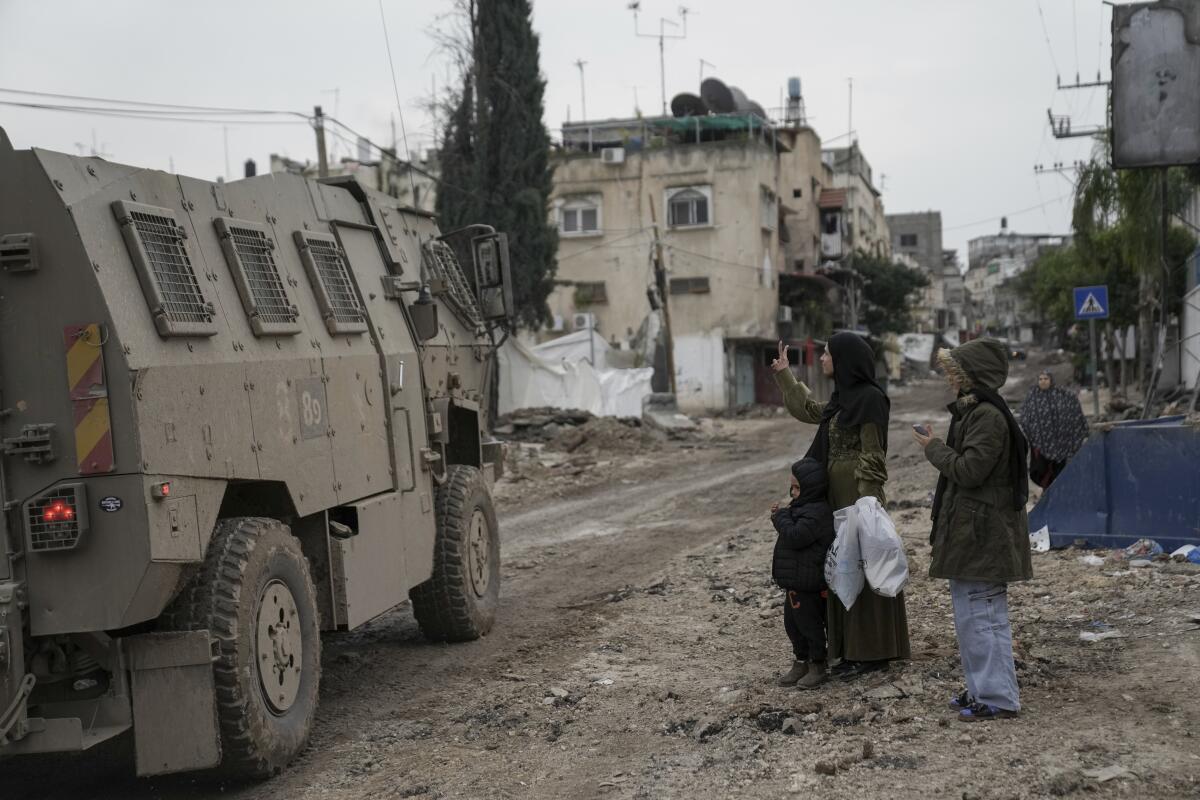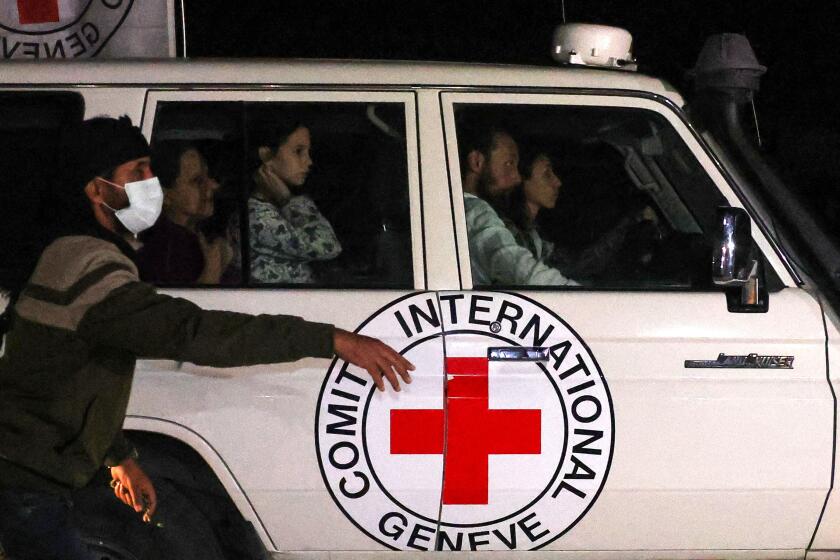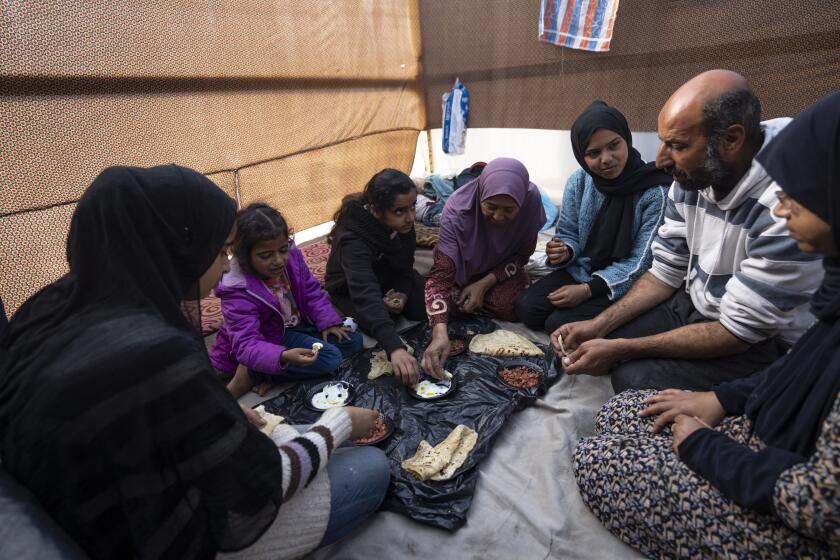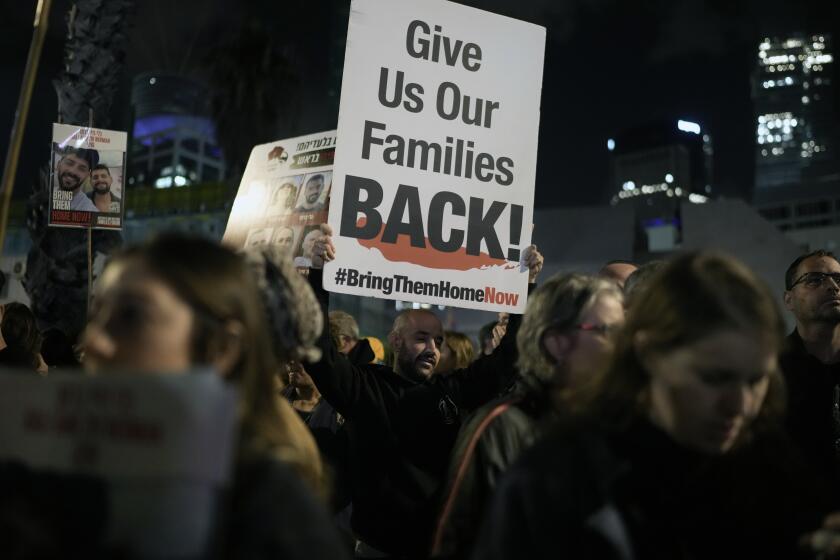Rifts emerge among top Israeli officials over how to handle the war in Gaza

- Share via
JERUSALEM — Rifts are emerging among top Israeli officials over the handling of the war in Gaza, with a member of the wartime Cabinet casting doubt on the strategy for rescuing hostages and the prime minister rejecting Washington’s calls to scale back the offensive.
Only a cease-fire deal can win the release of dozens of hostages still held by Hamas militants in Gaza, and claims that they could be freed by other means only spread “illusions,” said former army chief Gadi Eisenkot, one of five members of the wartime Cabinet, in his first public statements on the course of the war.
Eisenkot’s comments late Thursday were the latest sign of disagreement among political and military leaders over the direction of a war that is now in its fourth month.
Sparked by Hamas’ unprecedented Oct. 7 attack on Israel that killed about 1,200 people, mostly civilians, and saw about 250 others taken hostage, the Israeli assault has pulverized much of the Gaza Strip, home to some 2.3 million people. Israel has said more than 130 hostages remain in Gaza, but not all of them are believed to be alive.
Israel’s offensive, one of the deadliest and most destructive military campaigns in recent history, has killed nearly 25,000 Palestinians, according to Gaza health authorities, and uprooted more than 80% of the territory’s population.
The Hamas-run Health Ministry in Gaza said Friday that 142 people were killed and 278 people wounded the previous day, raising the death toll since Oct. 7 to 24,762 and the number of wounded to 62,108.
President Biden marked the 100th day in captivity for hostages of Hamas without mentioning the 24,000 Palestinians killed by Israel in that time.
Israel has also cut off all but a trickle of supplies into the besieged Gaza Strip, including food, water and fuel. Several dozen trucks with critical supplies now enter the territory each day, just a fraction of the prewar volume of about 500 trucks. Both the United States and United Nations have said more aid needs to be delivered.
A communications blackout in the territory was in its seventh day Friday, the longest such blackout since the war began. The lack of communications hampers the coordination of aid deliveries and rescue efforts.
The U.S., Israel’s closest ally, has provided strong military and political support for the campaign, but has been increasingly calling on Israel to scale back its assault and take steps toward establishing a Palestinian state after the war — a suggestion Israeli Prime Minister Benjamin Netanyahu has soundly rejected.
Speaking during a nationally televised news conference Thursday, Netanyahu reiterated his long-standing opposition to a two-state solution, arguing that a Palestinian state would become a launchpad for attacks on Israel.
Israel “must have security control over the entire territory west of the Jordan River,” Netanyahu said, adding: “That collides with the idea of sovereignty. What can we do?”
Palestinians seeking refuge in southern Gaza say every day has become a desperate struggle to find food, water, medicine and working bathrooms.
The U.S. has said the internationally recognized Palestinian Authority, which governs semiautonomous zones in the Israeli-occupied West Bank, should be “revitalized” and return to Gaza. Hamas ousted the authority from Gaza in 2007.
Washington has also called for steps toward the establishment of a Palestinian state. The Palestinians seek Gaza, the West Bank and East Jerusalem for their state. Those areas were captured by Israel in 1967.
Speaking Wednesday at the World Economic Forum in Davos, Switzerland, U.S. Secretary of State Antony J. Blinken said the two-state solution was the best way to protect Israel, unify moderate Arab countries and isolate Israel’s archenemy, Iran. He said that without a pathway to a Palestinian state, Israel would not “get genuine security.”
At the same conference, Saudi Arabia’s foreign minister said the kingdom was ready to establish full relations with Israel as part of a larger political agreement. “But that can only happen through peace for the Palestinians, through a Palestinian state,” he said.
Families of hostages held in Gaza for 100 days hold 24-hour rally, beg government to bring them home
Thousands of protesters have poured into a square in downtown Tel Aviv, beginning a 24-hour rally to draw attention to 132 hostages still held by Hamas in the Gaza Strip
A spokesperson for Palestinian Authority President Mahmoud Abbas said late Thursday that there can be “no security and stability in the region” without a Palestinian state.
Netanyahu and Israeli Defense Minister Yoav Gallant have said the fighting will continue until Hamas is crushed, and argue that only military action can win the hostages’ release.
Hamas seeks an end to the war before discussing hostage releases, and has demanded the release of thousands of Palestinians imprisoned by Israel in exchange for those held captive in Gaza.
Commentators have begun to question whether Netanyahu’s objectives are realistic, given the slow pace of the offensive and growing international criticism, including accusations of genocide at the United Nations’ highest court, which Israel vehemently denies.
Breaking News
Get breaking news, investigations, analysis and more signature journalism from the Los Angeles Times in your inbox.
You may occasionally receive promotional content from the Los Angeles Times.
Netanyahu’s opponents accuse him of delaying any discussion of postwar scenarios in order to avoid looming investigations of governmental failures, keep his coalition intact and put off elections. Polls show that the popularity of Netanyahu, who is on trial for corruption charges, has plummeted during the war.
Former army chief Eisenkot, whose son was killed in Gaza last month, told the investigative TV program “Uvda” late Thursday that “the hostages would return alive only if there is a deal linked to a significant pause in fighting.” He said dramatic rescue operations were unlikely because the hostages are apparently spread out, many of them in underground tunnels.
Claiming that hostages can be freed by means other than a deal “is to spread illusions,” he said.
In a thinly veiled criticism of Netanyahu, Eisenkot also said that strategic decisions about the war’s direction must be made urgently and that a discussion about an endgame should have begun immediately after the war started.
War in the Mideast has sharply divided California voters along lines of age and ideology. President Biden is caught in the middle, opposed by both left and right for his response to the fighting.
He also dismissed suggestions that the military had delivered a decisive blow against Hamas.
Gallant has said that troops disabled the Hamas command structure in northern Gaza, from which significant numbers of troops were withdrawn earlier in the week, and that the focus is now on the southern half of the territory.
“We haven’t yet reached a strategic achievement, or rather only partially,” Eisenkot said. “We did not bring down Hamas.”
The militant group has continued to fight back across Gaza, even in the most devastated areas, and launched rockets into Israel.
The lawsuit against Harvard accuses the university of tolerating antisemitism that has resulted in students being intimidated, harassed and assaulted.
In his interview, Eisenkot also confirmed that a preemptive strike against Lebanon’s Hezbollah militia was called off at the last minute during the early days of the war. He said he was among those arguing against such a strike in an Oct. 11 Cabinet meeting that he said left him hoarse from shouting.
Such an attack would have been a “strategic mistake” and would likely have triggered a regional war, Eisenkot said.
The former army chief said he is examining every day whether he should remain in the wartime Cabinet, which includes Netanyahu, Gallant, former Defense Minister Benny Gantz and Ron Dermer, strategic affairs minister in Netanyahu’s administration.
Eisenkot is a member of parliament in the opposition National Unity alliance headed by Gantz. Both joined Netanyahu to help lead the war.
“I know what my red line is,” Eisenkot said when asked at what point he would quit. “It’s connected to the hostages — that is one of the objectives — but it’s also connected to the way in which we need to run this war.”
The word has become shorthand for systems of oppressive rule around the world — and a popular refrain of pro-Palestinian activists.
The war has rippled across the Middle East, with Iranian-backed groups attacking U.S. and Israeli targets. Fighting between Israel and Hezbollah militants in Lebanon threatens to erupt into another all-out war, and Iran-backed Houthi rebels in Yemen continue to target international shipping despite U.S.-led airstrikes.
The U.S. conducted a sixth strike against Houthi rebels in Yemen on Friday, even as President Biden acknowledged that bombing the militants has yet to stop their attacks on shipping in the crucial Red Sea corridor.
More to Read
Sign up for Essential California
The most important California stories and recommendations in your inbox every morning.
You may occasionally receive promotional content from the Los Angeles Times.



















